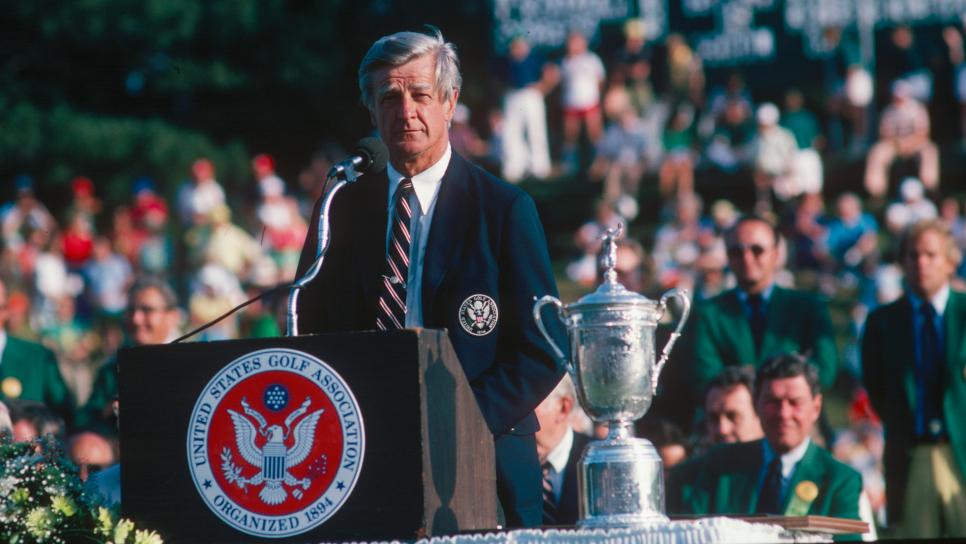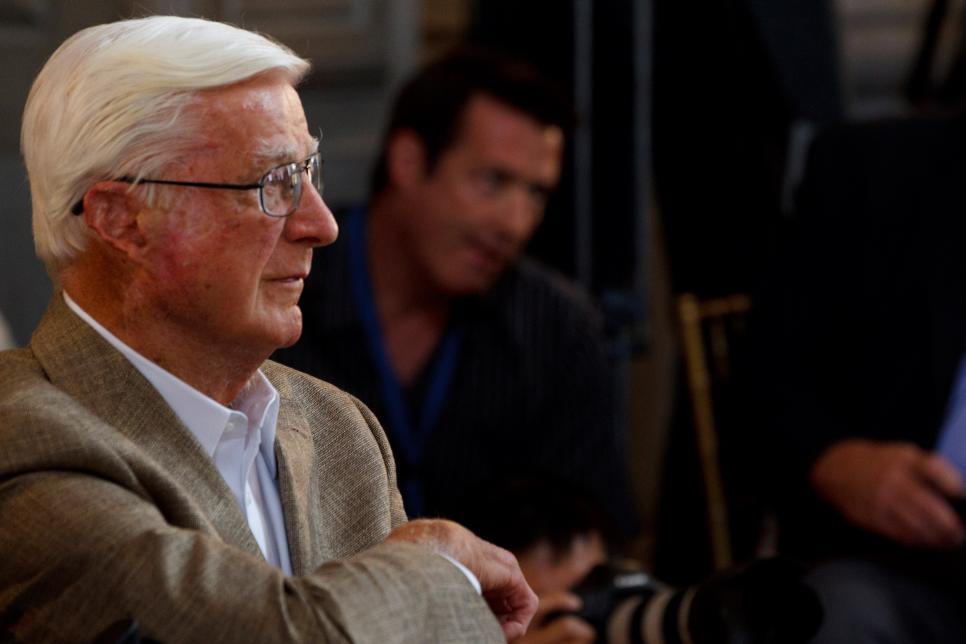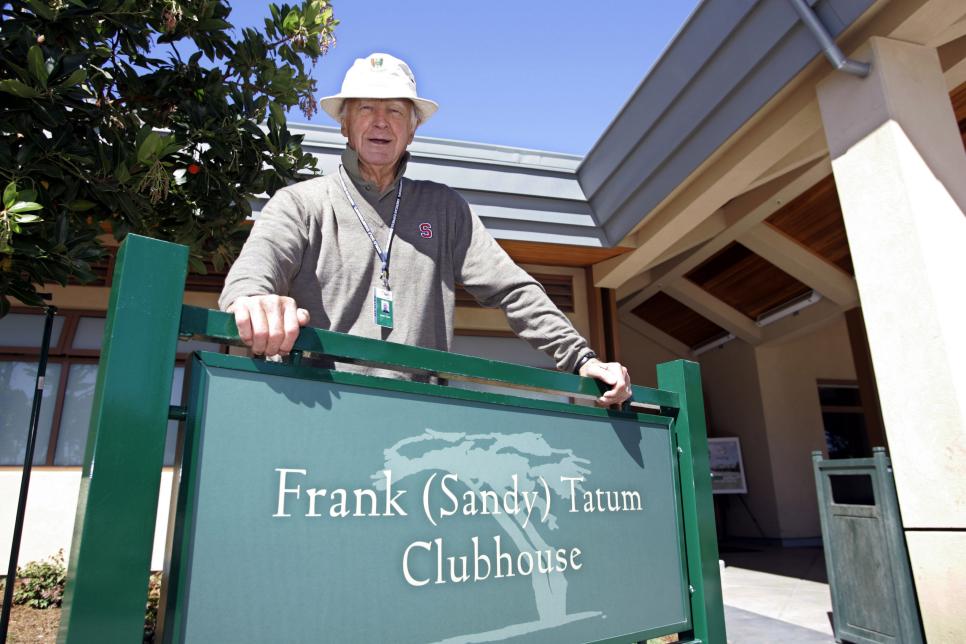
The moment has always stayed with me, a revitalizing reminder of what makes my job so privileged and satisfying. The magic I’m talking about, by definition, is rare. Sometimes the source is a giant like Jack Nicklaus or Lee Trevino. But it can be a journeyman, or a caddie or, really, anyone who can be described as a “golf person.” It happens when an interviewee conveys, with great generosity and enlightenment, their deepest understanding—and ultimately, love—of the game.
For me, the writing is hard, and always will be. But the listening is easy, and sometimes wonderful. And there have been few golf people better to listen to than Sandy Tatum, who sadly died Thursday at age 96.
The moment in question occurred in 2002, in one of those featureless construction-site trailers, being used by workers who were renovating Harding Park Golf Club in San Francisco. It was a cold, damp day, and it was dank amid the linoleum floor, plastic chairs and plywood. I was talking to Tatum, the prime mover in the renovation, for an article for Golf World. Despite the dreary physical environment, there was a warm intimacy to the setting. I was in my hometown, and my father, who 45 years before had started in me in the game at Harding, was sitting a few feet away, quietly observing.
But the closeness was really because of Tatum, who for all his patrician trappings—Rhodes Scholar, San Francisco power broker, former president of the USGA, authoritative eminence grise—was a man who brought down barriers between people and the connected. Still dynamic, handsome and charismatic at 82, Tatum’s deep, gravelly voice gave him a theatrical magnetism worthy of his Welsh/Irish heritage, which he used to persuade, but above all, to inspire.
In that trailer, with language that would seem verbose but for its clarity of thought and wisdom, he wended his way though the background of his involvement with Harding: as a player whose more than three decades of competing in the San Francisco City Championship made him a champion for public golf, how he finessed the city’s complex levers of power, and his hands-on involvement in executing the redesign. It all led to the “moment”— when his words calmly flowed with an extraordinary strength—what I later described as a “True Believer in the True Game preaching the gospel of his life.”
“Playing golf has all kinds of wonderful benefits for people, particularly on a quality golf course,” he said. “And that’s such a vital factor in what we’ve been able to accomplish here. We are giving these people something they can treasure and will matter immeasurably in their lives. Golf is anything but trivial. As the problems in the world become more terrible, this game is more important—on a sociological basis—than it has ever been. It’s a life enhancer and a life extender. There’s no question about that. It has everything that you can add from a game to somebody’s life.”
I was lucky to have a few special moments with Tatum. It wasn’t that I was around him very much. It’s that just about every time I was it, it was special.
There was a round at Cypress Point, where on the 13th fairway Tatum’s description of what he’d observed in his several rounds with Ben Hogan gave me a more palpable sense of what Hogan was like than anything I have ever heard.
“When it was Hogan’s turn to play, it was on the basis that he had been accorded the privilege of playing that particular golf shot,” he said. “And that privilege carried with it a responsibility. And that responsibility was to give that shot all the thought and effort that he could, and to make it as effective as he could. It was a very distinct characteristic.”

Jason O. Watson/Getty Images
He once, along with fellow former USGA president Grant Spaeth, hosted my father and I at the course where he played probably more than a thousand rounds, San Francisco Golf Club. Tatum was an inveterate walker, but because my also elderly (but younger than Tatum) dad couldn’t negotiate the landscape, he sacrificed his own enjoyment to share a cart with my father.
I’ve also drawn from Tatum’s 2012 recollection of winning the 1942 NCAA individual championship while a good but not great college golfer at Stanford.
“My teammates were wondering, ‘What the hell’s happened to Tatum?’ ” he said, still astonished by how he reached the zone of his life. “I learned early, and never more than in 1942, that the thrill in life is in going for it. You might lose more than you win. But it’s the way the moments happen.”
When Tatum had to finally stop playing golf two years ago, he continued to pour his energies into personal passions—the successful saving of Sharp Park, serving as a sounding board for today’s golf administrators and helping The First Tee of San Francisco thrive.
“Some of these kids come from a world that can be legitimately characterized as awful,” Tatum said of the Visitacion Valley neighborhood where both the dropout and murder rate are tragically high. “But to see them light up and be transformed by the values and structure and enjoyment that our game offers has been the ultimate affirmation of what I’ve longed believed. If I had one piece of advice for a young person, it would be to make a careful evaluation of the circumstances in which they find themselves, and locate in that setting whatever they can possibly locate that gives them a positive attitude about the life they have to live.”

ERIC RISBERG
In one of our last conversations, his und
ying enthusiasm led to an extemporaneous guide to aging gracefully.
“It adds up to this,” he said. “You no longer are able to do a lot of the things that made life so very satisfying through the years. So what you have to do is be able to accommodate those stages so that you don’t lose the essence of what you have left in your life.”
Herbert Warren Wind once wrote of Tatum’s idol, Bobby Jones, “Of the people I have met in sports—or out—Jones came the closest to being what we call a great man. Like Winston Churchill, he had the quality of being at the same time much larger than life and exceedingly human.”
So did Sandy Tatum.

